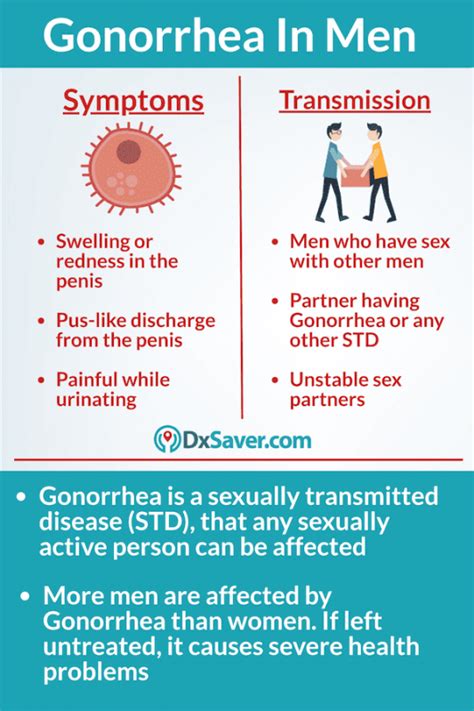What Are Gonorrhea Symptoms? Test Now

Gonorrhea, a sexually transmitted infection (STI), is caused by the bacterium Neisseria gonorrhoeae. It affects both men and women and can manifest in various parts of the body, including the genitals, rectum, and throat. Understanding the symptoms of gonorrhea is crucial for early detection, treatment, and preventing its spread. However, it’s also important to note that many individuals infected with gonorrhea may not exhibit any symptoms at all, which complicates the diagnosis and can lead to unintended transmission.
Symptoms in Men
Men with gonorrhea may experience several noticeable symptoms, although the absence of symptoms is also common. Typical symptoms include:
- Discharge from the penis: A thick, yellowish or greenish discharge from the penis is one of the most common symptoms. This discharge can be copious and is often accompanied by discomfort or pain.
- Painful urination: Burning sensation or pain while urinating (dysuria) is another key symptom. This pain can range from mild to severe.
- Painful testicles: Inflammation of the epididymis (epididymitis), the tube at the back of the testicle that stores and carries sperm, can cause pain and swelling in the testicles.
- Redness and swelling: The opening of the penis may become red and swollen.
- Fever: Some men may develop a fever, indicating that their body is fighting an infection.
Symptoms in Women
Women with gonorrhea are more likely than men to be asymptomatic, making regular screening crucial for those who are sexually active. When symptoms do occur, they may include:
- Abnormal vaginal discharge: An increase in vaginal discharge, which may be yellowish or greenish in color, can be a sign of gonorrhea.
- Painful urination: Similar to men, women may experience dysuria or a burning sensation while urinating.
- Pain during intercourse: Gonorrhea can cause inflammation of the cervix, leading to painful sexual intercourse.
- Pelvic pain: Some women may experience sharp pain in the lower abdomen due to pelvic inflammatory disease (PID), a complication of untreated gonorrhea.
- Bleeding between periods: Increased cervical inflammation can lead to irregular menstrual bleeding.
- Fever: Fever can be present due to the infection.
Symptoms in the Rectum and Throat
Gonorrhea can also infect the rectum and throat, especially in individuals who engage in anal or oral sex. Symptoms of rectal infection may include discharge, itching, and pain in the rectal area, while throat infections are often asymptomatic but can cause a sore throat.
Importance of Testing
Given the potential for asymptomatic infection, regular screening for gonorrhea is essential for anyone who is sexually active, especially those with multiple sexual partners. Early detection through testing can lead to effective antibiotic treatment, preventing complications such as infertility, pelvic inflammatory disease in women, and epididymitis in men.
Treatment and Prevention
Gonorrhea is typically treated with antibiotics, although antibiotic resistance is a growing concern. Preventive measures include practicing safe sex by using condoms consistently and correctly, reducing the number of sexual partners, and getting regular STI screenings. Vaccination against human papillomavirus (HPV) and hepatitis B can also protect against related infections, although there is no specific vaccine for gonorrhea.
Understanding gonorrhea symptoms and taking proactive steps towards prevention and regular health check-ups are key components in managing and reducing the incidence of this STI. If symptoms are present or there’s a suspicion of exposure, it’s crucial to seek medical care promptly.
What are the common symptoms of gonorrhea in men and women?
+Common symptoms in men include discharge from the penis, painful urination, and pain in the testicles. Women may experience abnormal vaginal discharge, painful urination, pain during intercourse, and pelvic pain. Both men and women can be asymptomatic.
How is gonorrhea transmitted and can it be prevented?
+Gonorrhea is primarily transmitted through sexual contact. Prevention measures include practicing safe sex by using condoms, reducing sexual partners, and regular STI screenings. There is no specific vaccine for gonorrhea.
What are the complications of untreated gonorrhea?
+Untreated gonorrhea can lead to serious complications, including pelvic inflammatory disease (PID) in women, which can cause infertility, and epididymitis in men, leading to infertility issues as well. Regular screening and early treatment are crucial to prevent these complications.
In conclusion, while gonorrhea can often be asymptomatic, recognizing its symptoms and understanding the importance of testing and prevention are vital steps in controlling the spread of this infection. Early detection and treatment not only improve individual health outcomes but also contribute to public health by reducing the incidence of gonorrhea and its complications.



